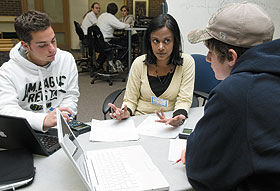  |
| HOME | THIS ISSUE | CALENDAR | GRANTS | BACK ISSUES | < BACK | NEXT > |
Q Center's peer tutoring popular with students needing help in math, science by Karen A. Grava - October 27, 2008 | ||||
| If Thomas Roby, associate professor of mathematics, was trying to explain the term “exponential” growth to a class, he might want to use the Q Center as an illustration. The center, which offers students tutoring in mathematics, statistics, chemistry, and physics, has experienced explosive growth since it was founded in 2004. So far this fall, it has had 4,813 visits, compared to 3,097 by this time last year. “Students like the center because they are often very shy about letting others know they are in trouble in a class,” says Roby, director of the center. “They like the center because of its peer tutoring.” Located on the first floor of the Babbidge Library, the center occupies space that formerly housed journals now available online. It is part of the “Learning Commons” at the library. “It’s a new way to use the library,” Roby says. The center operates from 11 a.m. to 11 p.m. four days a week (Monday through Thursday), and from 1 p.m. to 11 p.m. on Sunday. It’s set up like a chic café, with tables and stools, and except for the books spread out on the tables, a visitor might think it was a cozy place to socialize. “It’s very relaxed and cheerful and very convenient for students,” Roby says. “They come here and get tutored and then go to other parts of the library to study.” The popularity of the center has grown in part because students feel the need to do more practice problems than most instructors have time to cover in class, and because they lack math confidence. “We provide students with a lot of reinforcement,” says Álvaro Lozano-Robledo, assistant professor of math and assistant director of the Q Center. “We work hard to keep them encouraged, and that goes a long way toward teaching them to trust their judgment.” Lozano-Robledo says the students particularly like learning from other students, who are screened based in part on their grades in math, physics, and chemistry. “Students are often afraid that if they ask a professor a lot of questions, it will affect their grades. Here there is no power relationship between the student and the peer tutor,” he says. “And it’s very private.”
Janelle Hajjar, of North Andover, Mass., agrees. A sophomore majoring in biomedical engineering, she has used the center this year for tutoring in physics. Last year, she used it for help with both math and chemistry. “The center is great,” she says. “In class, the professors teach you what’s in the book. At the Q Center, the tutors tell you the tricks so that you do the problems easily.” Students who use the center sign in by filling out a short online survey about why they are there, their opinion of the center (nearly three-quarters of the students rate the center as either “very good” or “quite good”), and whether they have visited the center before. The web site also provides each tutor’s schedule, so a student can plan to work with the same tutor each time he or she visits. Student workers track which tutor is available and what courses they are able to tutor students in. “We try not to have a long wait time for the students who come to be tutored, so often we will have a tutor work with multiple students from the same class,” says Lozano-Robledo. Strangely, the quietest times at the center are often just before mid-term and final exams, because students are busy with course review sessions at those times. Roby says the center’s rapid growth has been a challenge. Finding enough furniture – and sufficient funding to provide extra tutors – has been a priority this semester. But, he adds, between the quality of the center’s help and recent budget cuts causing many departments to teach more students in large sections, the growth of the Q Center is expected to continue. |
| ADVANCE HOME UCONN HOME |

